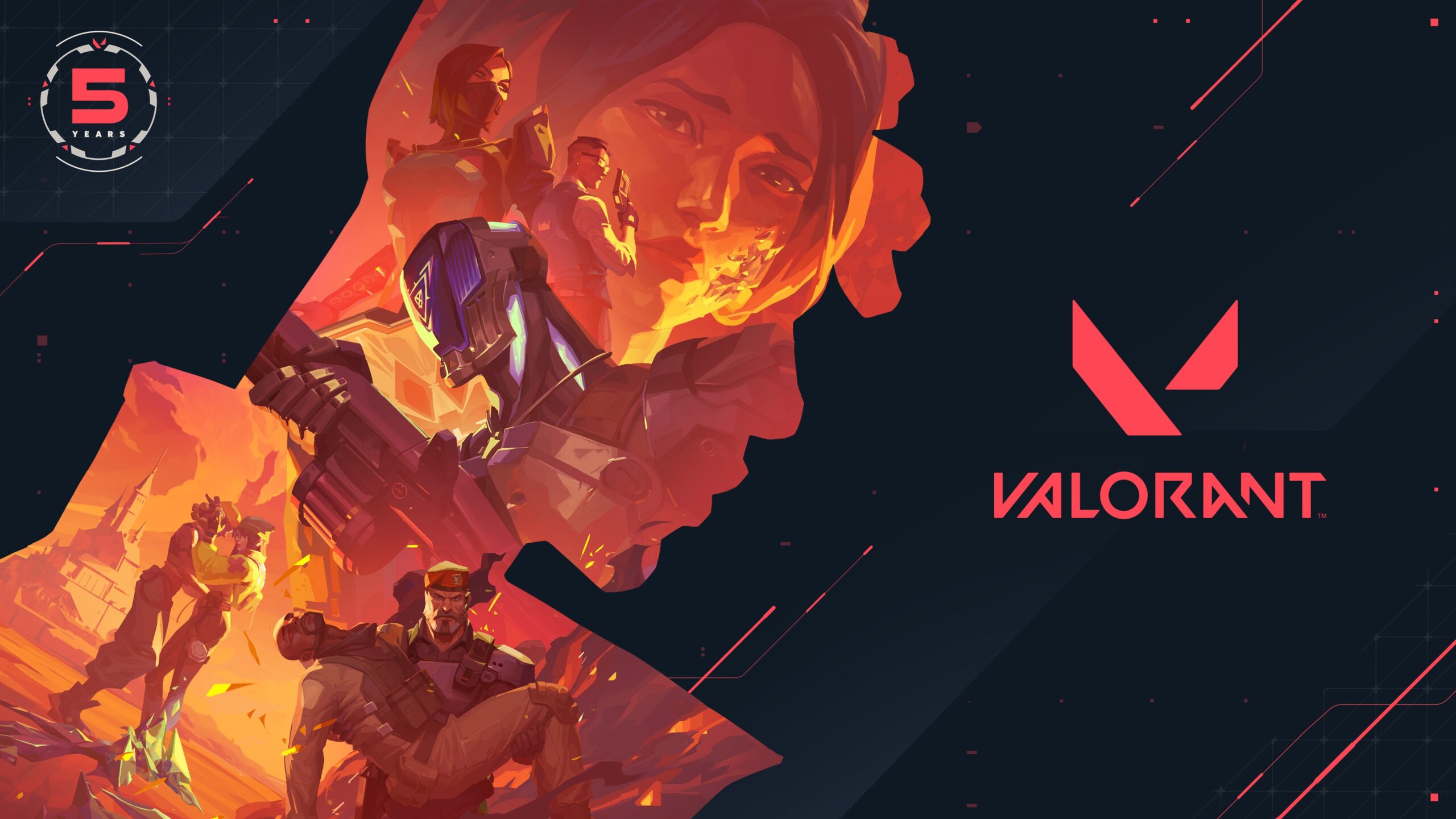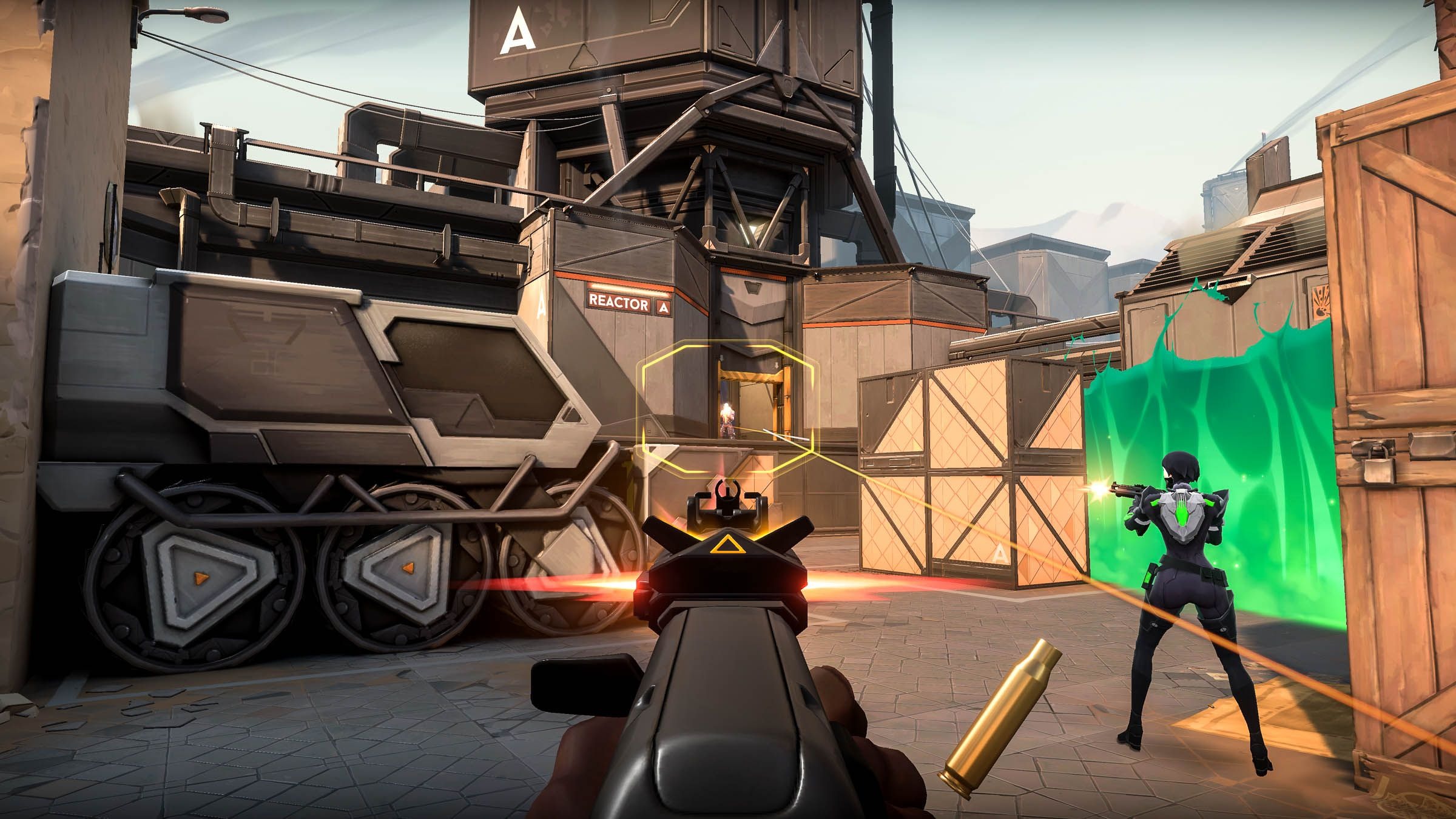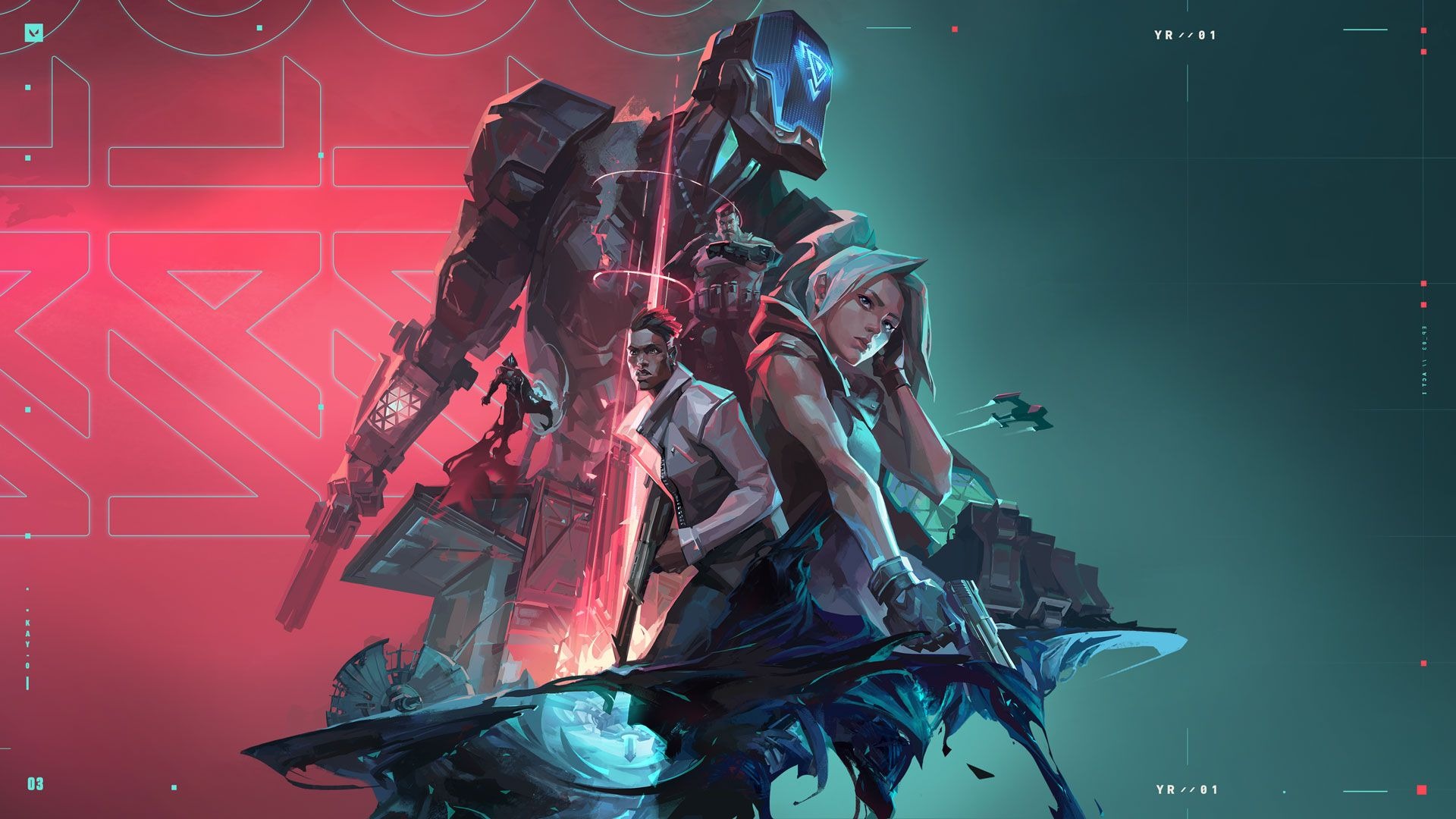
Valorant
All trademarks belong to their respective owners. Get GameMaster your aim and outplay enemies in Valorant — the free 5v5 tactical shooter from Riot Games. Download now and compete in the ultimate test of precision and strategy!
In the electrifying realm of competitive gaming, few titles have captured the hearts and minds of millions quite like Riot Games’ Valorant. This free-to-play tactical first-person shooter, launched in 2020, has not only cemented its place as a powerhouse in the esports scene but continues to innovate and dominate in 2025. Blending the precise gunplay of classic FPS titles with the strategic depth of hero-based abilities, Valorant offers a unique, high-octane experience that demands both sharp aim and sharp minds. Whether you’re a seasoned FPS veteran or new to the tactical shooter genre, Valorant delivers endless thrills, intense clutch moments, and a vibrant community that makes every “clutch or kick” round unforgettable. Get ready to dive into a world where precision meets strategy, and every decision can turn the tide of battle – because in Valorant, winning isn’t just about shooting; it’s about outsmarting.

Riot Games’ Masterpiece: The Genesis and Evolution of Valorant
Developed and published by Riot Games, the masterminds behind the global phenomenon League of Legends, Valorant emerged onto the PC gaming landscape in June 2020. Built from the ground up with competitive integrity at its core, Riot set out to create an online multiplayer experience free from the plagues of lag and cheating. The game quickly garnered immense popularity during its beta phase, fueled by extensive Twitch viewership and a dedicated focus on community feedback.

From its inception, Valorant was designed with a dual appeal: the raw, mechanical skill required for precise gunfights, reminiscent of CS:GO, and the dynamic, team-oriented strategies enabled by unique character abilities, drawing comparisons to Overwatch or Rainbow Six Siege. This hybrid approach struck a chord with players, attracting a diverse audience and fostering a rapidly growing player base that continues its upward trajectory in 2025. Riot’s commitment to regular content updates, a robust anti-cheat system (Vanguard), and a thriving esports ecosystem has ensured Valorant’s sustained relevance and success as a top-tier competitive shooter.
The Core Loop: Precision, Strategy, and Economic Warfare
At its heart, Valorant is a 5v5 character-based tactical shooter. Matches consist of up to 25 rounds, with the first team to win 13 rounds emerging victorious. Players alternate between attacking and defending, with different objectives based on their role:
- Attackers: The primary objective is to plant a “Spike” (bomb) at one of the designated bomb sites (A, B, C depending on the map) and ensure it detonates. Alternatively, they can eliminate all opposing defenders.
- Defenders: Their goal is to prevent the Spike from being planted, or if planted, to defuse it before it detonates. Eliminating all attackers also secures the round.
Each round begins with a buy phase, where players use credits earned from previous rounds to purchase weapons, shields, and Agent abilities. This economic system is crucial, forcing teams to strategize not only about their current round but also about future rounds, leading to “eco rounds” (saving money) and “full buy rounds” (spending big). This adds a layer of depth not commonly found in all FPS games.
Gunplay Mechanics: Valorant’s gunplay is characterized by its emphasis on precision aim and controlled bursts. Unlike many other shooters, movement while shooting significantly reduces accuracy, reinforcing a deliberate, tactical playstyle. Each weapon has a unique spray pattern and recoil, requiring players to master them through practice. Headshots are critically important, often resulting in one-shot kills with many weapons, elevating the skill ceiling and rewarding pinpoint accuracy. The game’s netcode and tick rate are optimized to provide a smooth, responsive shooting experience, minimizing peeker’s advantage and ensuring fair engagements.
The Agents of Change: Abilities and Strategic Depth
Valorant’s most defining feature is its diverse roster of “Agents,” each with four unique abilities: two basic abilities purchased per round, one signature ability that’s free and refreshes (or charges), and a powerful ultimate ability that charges through kills, deaths, Spike plants/defuses, or collecting ultimate orbs. These abilities are categorized by role:
- Duelists: Entry fraggers focused on getting kills and creating space for their team (e.g., Jett, Raze, Reyna, Phoenix, Yoru, Neon, Iso, Waylay).
- Initiators: Agents who clear angles and gather information (e.g., Sova, Breach, Skye, KAY/O, Fade, Gekko, Tejo).
- Controllers: Masters of smoke and vision manipulation, controlling map flow (e.g., Brimstone, Omen, Viper, Astra, Harbor).
- Sentinels: Defensive specialists who hold flanks and lock down sites (e.g., Cypher, Killjoy, Sage, Deadlock, Chamber, Vyse).
The combination of these abilities creates a dynamic “utility economy” that’s as important as the weapon economy. Effective team composition and coordinated use of abilities are paramount to success. For instance, a Duelist might entry a site after an Initiator flashes and a Controller smokes, followed by a Sentinel locking down the plant site.
New Agents in 2025: Riot Games continues to expand the Agent roster, constantly shaking up the meta. While specific new Agents beyond those already introduced (like Clove in late 2024) are often shrouded in mystery until closer to release, the consistent introduction of fresh abilities and playstyles ensures the game remains strategically deep and exciting. As of mid-2025, the meta continues to evolve, with Agents like Yoru, Jett, Raze, and the new Sentinel Vyse (introduced in late 2024) often dominating the top tiers, highlighting a focus on aggressive dueling and robust defensive setups.
Map Design and Tactical Landscapes
Valorant’s maps are intricately designed battlegrounds, each with unique layouts, choke points, and tactical considerations. Every map encourages different agent compositions and strategies. As of mid-2025, the map pool is dynamic, with Riot regularly rotating maps in and out of competitive play to keep the experience fresh.
- Ascent: A classic three-lane map with a prominent mid-control area and destructible doors.
- Bind: Known for its two one-way teleporters, allowing for rapid rotations and unique flanking opportunities.
- Haven: The only map with three bomb sites, creating complex defensive challenges and diverse attack routes.
- Split: A highly vertical map with ropes and tight corridors, emphasizing strong control of central areas.
- Pearl: An underwater, more open map with long sightlines, favoring precise aim duels and strategic use of utility.
- Lotus: Introduced in early 2023, featuring three sites and rotating doors, demanding quick decision-making.
- Sunset: Launched in late 2024, a two-site map with a focus on mid-control and distinct attack paths.
- Corrode: The newest map introduced in June 2025 (Patch 11.00), a standard 5v5 map with two bomb sites (A & B). Its design features a three-lane structure with a simplified mid, open sightlines, and layered defense zones. The theme is a radianite-infused French village caught in a salt storm, providing a fresh backdrop for tactical engagements. This map emphasizes positioning and precision due to its open nature.
Riot often tweaks maps based on competitive play and player feedback, refining gameplay flow and balance. The constant rotation and updates ensure that players must adapt their strategies and learn new callouts, preventing stagnation.
Vanguard: Riot’s Unyielding Anti-Cheat Fortress
One of Valorant’s most significant strengths, and a key factor in its competitive integrity, is Riot Vanguard, the proprietary anti-cheat system. Vanguard runs at the kernel level of a player’s operating system, actively monitoring for unauthorized third-party software and behaviors that indicate cheating.
While its deep integration has sometimes sparked privacy concerns, Riot has consistently reiterated its commitment to player security and explained Vanguard’s necessity in maintaining a fair playing field, especially for a skill-based FPS. Vanguard’s continuous evolution involves:
- Proactive Detection: Identifying and preventing cheats from running.
- Reactive Banning: Permanently banning players caught cheating, with a strong focus on hardware bans for repeat offenders.
- Behavioral Analysis: Utilizing machine learning to detect suspicious in-game behavior that might indicate cheating.
- Rapid Response: Riot’s anti-cheat team is constantly updating Vanguard to counter new cheat methods, often within days of their appearance.
This uncompromising stance on cheating has fostered a highly competitive and relatively clean environment, a crucial factor for a thriving esports ecosystem and player trust.
The Pinnacle of Competition: Valorant Champions Tour (VCT) 2025
Valorant’s esports scene is nothing short of phenomenal. The Valorant Champions Tour (VCT) is Riot Games’ official global professional circuit, featuring regional leagues, international Masters events, and culminating in the grand finale, Valorant Champions. In 2025, the VCT continues to expand and refine its format, solidifying its status as a top-tier competitive gaming spectacle.
Key elements of VCT 2025:
- International Leagues (ILs): Regional leagues in Americas, EMEA, Pacific, and China where partnered teams battle for dominance and slots in global events.
- Kickoff Tournaments: Early-season events that set the tone and award initial Championship Points.
- Masters Events: Two major international tournaments (e.g., Masters Bangkok and Masters Toronto completed in early 2025) that bring together top teams from across the ILs, offering significant prize pools and crucial Championship Points.
- Challengers Circuit: A robust tier-two system that allows aspiring teams to compete and potentially ascend into the International Leagues through Ascension tournaments.
- Game Changers: A dedicated circuit supporting women and marginalized genders in Valorant esports, fostering inclusivity and providing a clear path to professional play.
- Championship Points System: Revamped for 2025, teams earn points throughout the season from Kickoff, IL Stages, and Masters events. The top teams qualify for Valorant Champions 2025, the ultimate showdown with a staggering $2,250,000 prize pool (scheduled for September 12 – October 5, 2025). This enhanced system ensures more consistent pathways to the global stage.
The VCT 2025 is currently in its Stage 2 for various regions (e.g., Pacific, China, EMEA, Americas Stage 2s are ongoing or upcoming in July-August 2025), with teams fiercely competing for glory and a chance to qualify for Champions. The broadcast quality, passionate casters, and incredible plays by professional Valorant players make watching the VCT an exhilarating experience for millions of fans worldwide.
Monetization and Customization: Beyond the Gameplay
As a free-to-play game, Valorant’s revenue model relies heavily on cosmetic customization. Players can purchase Valorant Points (VP) using real money to acquire:
- Weapon Skins: These are the primary revenue driver, ranging from elegant designs to elaborate themed bundles with custom animations, sound effects, and unique “finishers” (special animations that play when the last enemy is killed with that skin). New skin lines like “Perch,” “Space Piercer,” and “ATLAS // CMD” are featured in Act 4 of Season 2025, alongside the highly anticipated “Cyrax Bundle” with its cyberpunk aesthetic.
- Agent Skins: While less frequent than weapon skins, these allow players to customize their Agent’s appearance.
- Battle Pass: A seasonal progression system offering a blend of free and premium rewards (weapon skins, gun buddies, player cards, sprays, titles) for completing daily and weekly challenges. The Season 25 Act 2 Battle Pass, for example, introduced new collections like “Recon” and “Doodle Buds.”
- Radianite Points (RP): Earned through the Battle Pass or purchased with VP, used to upgrade weapon skins to unlock new visual effects, animations, and color variants.
- Night Market: A rotating in-game store that offers personalized discounts on a selection of previously released weapon skins, providing a chance for players to snag desired items at a lower price.
Riot maintains a “cosmetics-only” approach to monetization, ensuring that purchases do not offer any in-game advantage, thus preserving the game’s competitive integrity and fair play. This commitment to player experience over aggressive monetization is a key factor in its sustained popularity.
Recent Updates and The Road Ahead for Valorant (Mid-2025)
Riot Games’ commitment to refreshing Valorant is relentless. As of mid-July 2025, several significant updates and events have shaped the game:
- Unreal Engine 5 Upgrade (Patch 11.02): A major technical overhaul is coming with Patch 11.02 (scheduled for July 29, 2025), upgrading Valorant to Unreal Engine 5. This promises better performance, improved frame rates, and significantly faster patch installations, enhancing the overall player experience on modern hardware. Players logging in during the 11.02 rollout will receive a limited-time Gun Buddy.
- New Map “Corrode”: Introduced in Patch 11.00 (June 2025), Corrode adds a fresh tactical landscape to the competitive map pool, influencing agent meta and team strategies.
- Agent Balance Changes: Patches like 10.09 (May 2025) and 10.04 (March 2025) brought changes to various agents like Tejo, Breach, and KAY/O, continuously shifting the meta and encouraging diverse playstyles.
- New Duelist “Waylay”: Introduced in Patch 10.04 (March 2025), Waylay joined the roster, bringing new dynamics to the duelist category.
- Competitive System Refinements (Season 2025 Act 4): A full rank reset at the start of Act 4, an increased maximum placement rank (Ascendant 3), and new competitive rules aim to refresh the ranked experience and reward progression. The 2025 matchmaking algorithm also prioritizes team balance.
- Premier Rewards: Continued updates to the Premier system, offering more structured competitive play for teams outside the professional circuit.
- Community Engagement: Riot actively fosters its community through various events, fan art showcases, and developer diaries, keeping players engaged beyond just gameplay. The recent “Champions of Champions: Fan Art, Cosplay, Esports Edits” event (June 2025) highlighted the creative spirit of the Valorant fanbase. University-level tournaments across regions also continue to thrive.

The future of Valorant looks robust, with Riot’s continuous investment in game updates, esports infrastructure, and anti-cheat technology. The planned UE5 upgrade signals a long-term vision for the game’s technical foundation, ensuring it remains at the forefront of the competitive FPS genre for years to come.
Conclusion: Why Valorant Remains a Dominant Force in Gaming
Valorant is more than just a first-person shooter; it’s a meticulously crafted tactical experience that has set new standards for competitive gaming. Its compelling blend of razor-sharp gunplay, diverse agent abilities, and strategic map design ensures endless hours of thrilling matches. With Riot Games’ unwavering commitment to anti-cheat measures, a vibrant and expanding esports ecosystem, and a constant stream of new content and balance updates, Valorant continues to evolve and captivate its massive global audience. Whether you aspire to be the next pro player or simply enjoy high-stakes tactical action with friends, Valorant offers an unparalleled online multiplayer journey. Load up, coordinate with your team, and prepare to seize that “GG EZ” victory – because in Valorant, every round is a chance to prove your skill and strategic prowess.